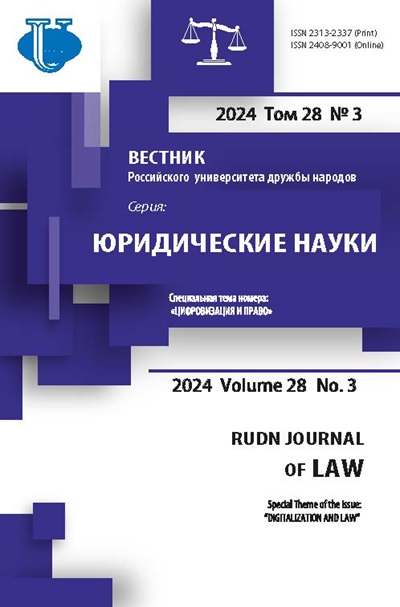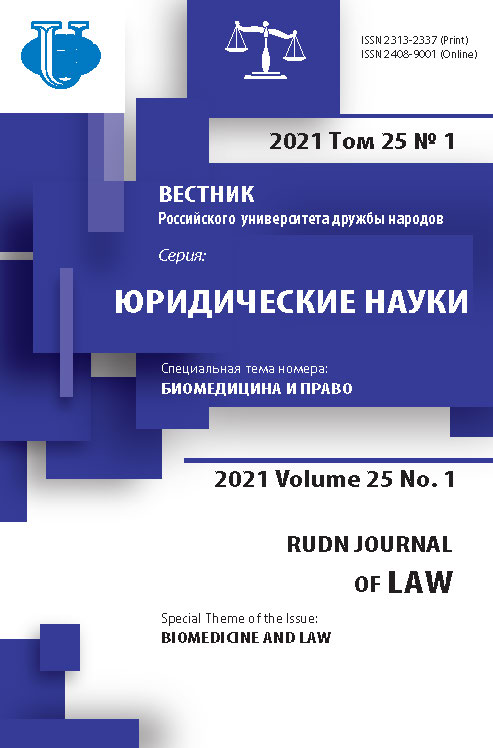Саморегулирование генетических исследований в России: поиск оптимальной модели
- Авторы: Алимов Э.В.1, Лещенков Ф.А.1
-
Учреждения:
- Институт законодательства и сравнительного правоведения при Правительстве Российской Федерации
- Выпуск: Том 25, № 1 (2021): БИОМЕДИЦИНА И ПРАВО
- Страницы: 126-143
- Раздел: ГЕНЕТИКА И ПРАВО
- URL: https://journals.rudn.ru/law/article/view/26039
- DOI: https://doi.org/10.22363/2313-2337-2021-25-1-126-143
Цитировать
Полный текст
Аннотация
Статья посвящена общему анализу практики саморегулирования генетических исследований в России (как государственными научными организациями, так и коммерческими компаниями). Саморегулирование представляет собой регулирование организациями, осуществляющими генетические исследования, их объединениями, а также соответствующим профессиональным и научным сообществом (посредством локальных актов, соглашений, меморандумов, профессиональных стандартов, этических кодексов) отношений, складывающихся в области организации, проведения и использования результатов генетических исследований. В целом в мировой практике регулирования различных аспектов организации и проведения генетических исследований саморегулирование генетических исследований играет особую роль. Проведенный в статье анализ позволил сделать вывод, что в России практика саморегулирования, хотя и крайне фрагментарно, но все же применяется в ряде государственных научных учреждений. Можно отметить в целом медленное развитие такого регулирования в России в государственных научных учреждениях. При этом негосударственные геномные организации в целом уклоняются от значимого саморегулирования своей деятельности, не предусматривая каких-либо расширенных правил и стандартов о своей деятельности (либо ограничиваясь отсылочными формулировками, общими положениями, не отвечающими специфике данной деятельности). Вместе с тем важно учитывать, что действующее законодательство Российской Федерации имеет значительные пробелы в области регулирования процесса генетических исследований. Посредством проведенного в статье анализа ряда интернет-сайтов российских частных компаний, оказывающих услуги генетического профиля, авторы пришли к выводу, что данными организациями практически не проводится работа по созданию комплексных информационных пособий (на их информационных порталах), а тем более стандартов проведения генетических исследований в доступной для пациентов форме. Также в открытой форме нет сведений о возможных рисках и угрозах для пациентов в связи с применением той или иной процедуры, редко раскрывается вопрос о возможности предоставления полученной геномной информации о пациенте третьим лицам (например, правоохранительным органам). Приходится констатировать, что в России в целом недостаточной степени развит институт саморегулирования генетических исследований. Этот вывод был сделан на основе проведенного анализа информации об организации и деятельности отмеченных организаций (государственных и коммерческих), имеющейся в открытом доступе. Так, например, практически отсутствуют опубликованные стандарты проведения геномных исследований, документы о защите прав пациентов - участников генетических исследований и др. Сложившийся в настоящее время фрагментарный характер законодательного регулирования и саморегулирования генетических исследований может способствовать нарушению прав и законных интересов пациентов в части обеспечения конфиденциальности и сохранности генетической информации, полученной в ходе генетического исследования. Соответственно, государство в рамках поставленной цели интенсивного развития генетических технологий должно создать необходимые условия, в том числе правового характера, которые способствовали бы последовательному достижению поставленных задач. Однако нерешенными до настоящего времени остаются такие задачи, как: правовая регламентация статуса участников генетических исследований, защита генетической информации граждан, стимулирование проведения генетических исследований и др. Представляется, что возможным способом решения отмеченных проблем является осуществление соответствующего комплексного правового регулирования (в том числе с помощью ведомственных актов), а также рассмотрение вопроса о предоставлении ведущим государственным научным учреждениям специальной функции (например, в рамках отдельного совета, комиссии или ассоциации) по регулированию отдельных аспектов организации, проведения генетических исследований и использования их результатов (в рамках законодательного регулирования), что должно иметь обязательный характер, в том числе для негосударственных организаций, оказывающих услуги генетического характера на территории Российской Федерации.
Об авторах
Эмиль Ваизович Алимов
Институт законодательства и сравнительного правоведения при Правительстве Российской Федерации
Автор, ответственный за переписку.
Email: emil.alimov@gmail.com
кандидат юридических наук, научный сотрудник отдела конституционного права
117218, Российская Федерация, г. Москва, ул. Большая Черемушкинская, д. 34Феликс Артемович Лещенков
Институт законодательства и сравнительного правоведения при Правительстве Российской Федерации
Email: foreign2@izak.ru
научный сотрудник отдела конституционного, административного и уголовного законодательства и международного права
117218, Российская Федерация, г. Москва, ул. Большая Черемушкинская, д. 34Список литературы
- Алимов Э.В. Правовой статус участников генетических исследований в России: постановка проблемы // Вестник МГПУ. Серия «Юридические науки». 2020. № 3. С. 33-41. doi: 10.25688/2076-9113.2020.39.3.04
- Blasimme, A., Moret, C., Hurst, S.A. & Vayena, E. (2017) Informed Consent and the Disclosure of Clinical Results to Research Participants. The American Journal of Bioethics. 17(7), 58-60. doi: 10.1080/15265161.2017.1328532
- Блинов А.Г. Правовая среда проведения геномных исследований и перспективы ее оптимизации в России // Вестник Омского университета. Серия «Право». 2018. № 4(57). С. 138-144. doi: 10.25513/1990-5173.2018.4.138-144
- Branum, R., Wolf, S. M. (2015) International Policies on Sharing Genomic Research Results with Relatives: Approaches to Balancing Privacy with Access. The Journal of Law, Medicine & Ethics. 43(3), 576-593. doi: 10.1111/jlme.12301
- Дубов А.Б., Дьяков В.Г. Безопасность геномной информации: правовые аспекты международного и национального регулирования // Вестник Университета имени О.Е. Кутафина (МГЮА). 2019. № 4. С. 127-137. doi: 10.17803/2311-5998.2019.56.4.127-137
- Isasi, R., Kleiderman, E. & Knopper, B.M. (2016) Editing policy to fit the genome? Science. 351(6271), 337-339. doi: 10.1126/science.aad6778
- Калиниченко П.А., Косилкин С.В. Геномные исследования: стандарты Совета Европы и правовое регулирование в России // Вестник Университета имени О.Е. Кутафина (МГЮА). 2019. № 4. С. 108-118. doi: 10.17803/2311-5998.2019.56.4.108-118
- Knoppers, B.M. (2014) International ethics harmonization and the global alliance for genomics and health. Genome Medicine. 6(2), 13. doi: 10.1186/gm530
- Лапаева В.В. Концепция совершенствования российского законодательства, регулирующего развитие исследований в области генома человека // Труды Института государства и права РАН. 2020. Т. 15. № 2. С. 111-134. doi: 10.35427/2073-45222020-15-2-lapaeva
- Lévesque, E., Joly, Y. & Simard, J. (2011) Return of Research Results: General Principles and International Perspectives. Journal of Law, Medicine & Ethics. 39(4), 583-592. doi: 10.1111/j.1748-720X.2011.00625.x
- Lin, Z., Owen, A.B. & Altman, R.B. (2004) Genomic Research and Human Subject Privacy. Science. 305(5681). doi: 10.1126/science.1095019
- Машкова К.В., Широков А.Ю. Становление правового статуса прикладных геномных исследований через формирование саморегулируемых профессиональных ассоциаций // Актуальные проблемы российского права. 2020. № 15(10). С. 132-140. doi: 10.17803/1994-1471.2020.119.10.132-140
- Машкова К.В., Варлен М.В., Широков А.Ю. Саморегулирование геномных исследований и перспективы персонифицированной медицины // Lex russica (Русский закон). 2020. № 8. С. 54-61. doi: 10.17803/1729-5920.2020.165.8.054-061
- Монтгомери Дж. Модификация генома человека: вызовы со стороны сферы прав человека, обусловленные научно-техническими достижениями // Прецеденты Европейского суда по правам человека. 2018. № 3(51). С. 42-56
- Munnich, A. (2019) La Médecine Génomique Personnalisée: Prédire ou Médire? Bulletin de l’Academie Nationale de Medecine. 203(6), 409-412. Doi.org/10.1016/j.banm.2019.06.006 (in French)
- Nanba, S.B., Akopyan, O.A., Alimov, E.V., Garmaeva, M.A. & Bedoeva, Z.N. (2020) State Programs for the Development of Genetic Technologies. Opción. (26), 732-750
- Назаров В., Сисигина Н. Экономика генетического здравоохранения // Экономическая политика. 2018. Т. 13. № 6. С. 188-213. doi: 10.18288/1994-5124-2018-6-188-213
- Rothstein, M.A., Knoppers, B.M. & Harrell, H.L. (2016) Comparative Approaches to Biobanks and Privacy. The Journal of Law, Medicine & Ethics. 44(1), 161-172. Doi: 10.1177/ 1073110516644207
- Thorogood, A., Dalpé, G. & Knoppers, B. (2019) Return of Individual Genomic Research Results: are Laws and Policies Keeping Step? European Journal of Human Genetics. (27), 535- 546. doi: 10.1038/s41431-018-0311-3
- Варлен М.В., Машкова К.В., Зенин С.С., Барциц А.Л., Суворов Г.Н. Поиск общих принципов саморегулирования геномных исследований в контексте обеспечения приоритетной защиты прав и законных интересов личности // Проблемы права. 2019. № 3(72). С. 11-20
- Янковский Н.К., Боринская С.А. Геном человека: научные и практические достижения и перспективы // Аналитический обзор. Вестник РФФИ. 2003. № 2. С. 46-63
- Зенин С.С. Государственное регулирование и саморегулирование отношений в сфере генетических исследований: к формированию оптимальной моли // Проблемы права. 2020. № 3(77). С. 7-8
















